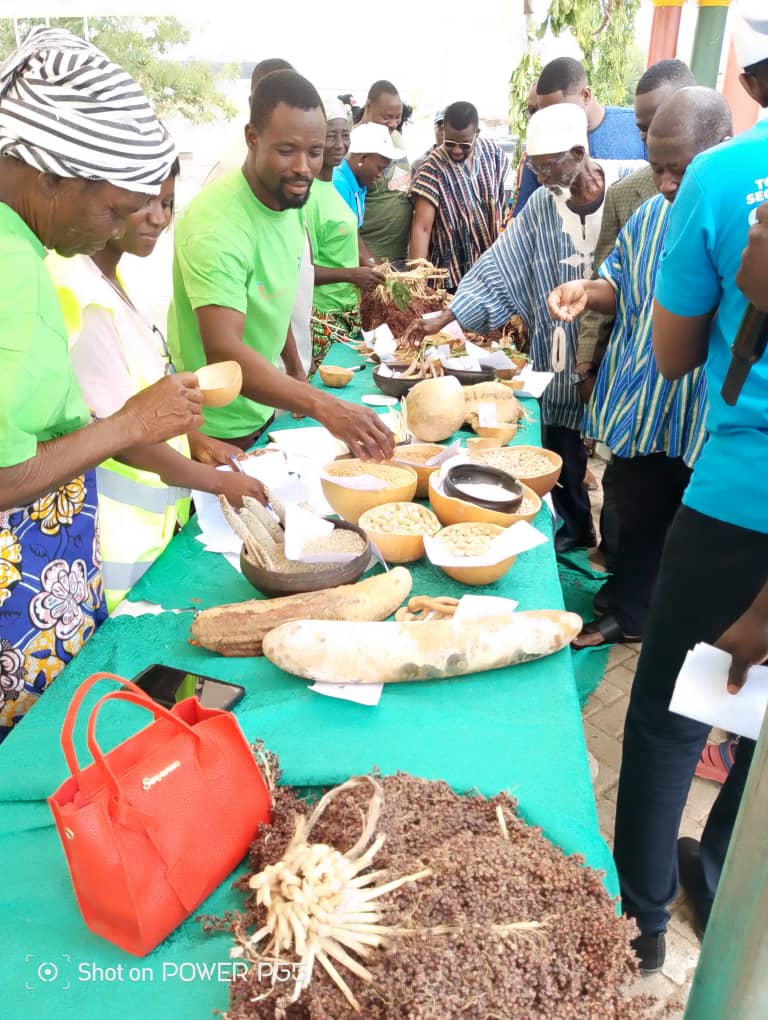By Anthony Adongo Apubeo
Bolgatanga, July 3, GNA – A Seed Fair, aimed at restoring Ghanaian indigenous seeds which have gone extinct has been held in Bolgatanga in the Upper East Region.
The fair, organised by Trax Program Support Ghana (Trax Ghana) in partnership with BELLA Centre for Indigenous Africa Foods (BEELA), two Non-Governmental Organisations, attracted smallholder farmers from the Upper East and North East Regions and other state and non-state actors.
The occasion provided a platform for the few smallholder farmers who still relied on Indigenous seeds for planting to showcase their indigenous seeds and afforded them the opportunities to share their experiences to encourage more farmers to use indigenous seeds for planting.
The fair is part of a project dubbed, “Strengthening Local and Indigenous Food Systems in the Upper East and North East Regions of Ghana,” jointly being implemented by the two NGOs and is aimed at conserving biodiversity, preserving community seed systems and seed sovereignty, promoting knowledge sharing and traditions among farmers.
Addressing the stakeholders at the fair, Ms Abena Offei-Gyimah, the Technical Support Officer of the project, expressed worry about the extinction of most indigenous seeds in many communities in the Region, and other parts of the Northern sector.
She explained that research jointly conducted by Trax Ghana and the BELLA Centre for Indigenous Africa Foods, revealed that varieties of most Indigenous seeds such as early and late millet, sorghum, rice, corn, beans, Bambara beans, and okro have gone extinct.
She stated that as part of the project implementation, some smallholder farmers in the communities have been selected and their capacity built as lead farmers and action plans drawn to help propagate the need to plant indigenous seeds.
Ms Offei-Gyimah added that the project also built the capacity of smallholder farmers to undertake exchange visits where smallholder farmers exchanged and shared Indigenous seeds with those who do not have them while also sharing good Indigenous farming practices.
She noted that the project would further build the capacity of the smallholder farmers to establish Indigenous Seed Banks to supply indigenous seeds to more smallholder farmers in communities to plant.
Mr Damian Paaga, an official from the Navrongo-Bolgatanga Catholic Diocesan Development Organisation , indicated that indigenous seeds were very suitable to the climate change variability in the northern parts of the country.

He demystified the notion that the natural production and application of organic manure on indigenous seed-planted crops brought about health complication issues associated with inorganic fertilizers application on farms.
He further stated that the instances where farmers who applied chemicals such as weedicides and pesticides on their farms and as a result got sick could be curbed when farmers were taught natural ways of controlling weeds and pesticides.
Mr Vincent Subbey, Director of Trax Ghana, said Trax Ghana is a not-for-profit established to promote agroecology and conservation of biodiversity for enhanced food security and sustainable development in northern Ghana.
He stated that over the years his outfit had implemented a series of interventions and programmes which had led to the empowerment of the vulnerable and mentioned that the current project was one of such interventions.
The Seed Fair was preceded by a float through the principal streets in the Bolgatanga Municipality to draw public attention to the need to go into indigenous seed planting.
GNA